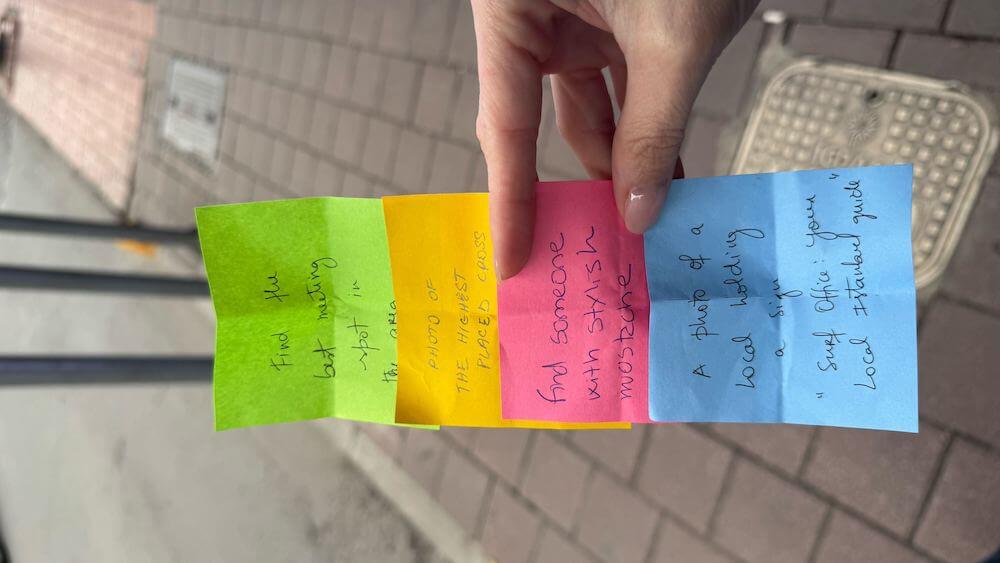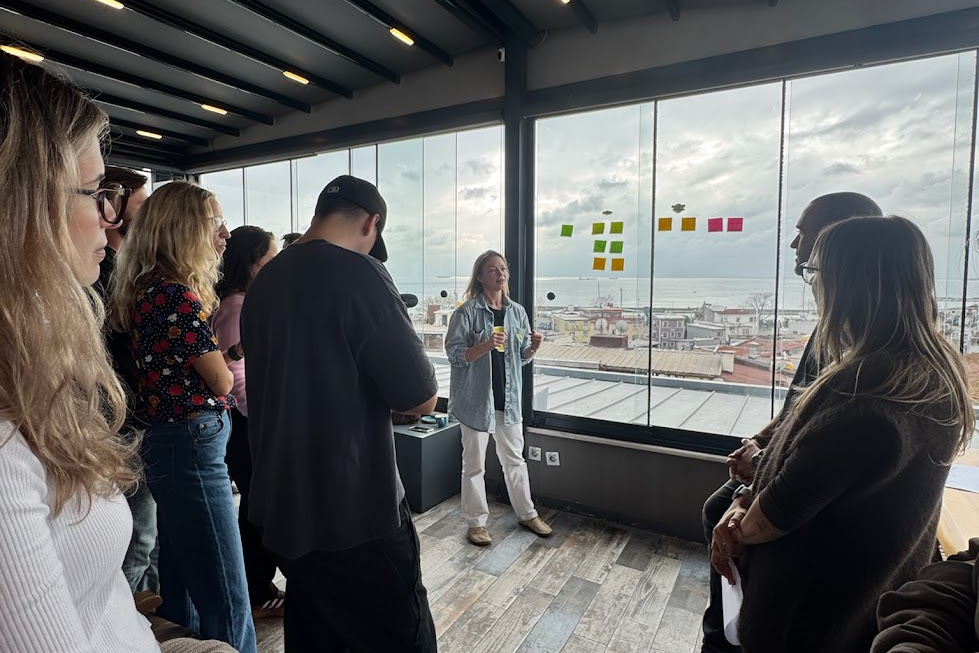


Most mistakes people make when organizing their first company offsites are easily avoided.
In this article, we’ll summarise those mistakes and teach you how to avoid them.
At Surf Office, we've organized hundreds of company offsites for our customers and even a couple of offsites for our own team. We’re a remote-first company, so meeting in person from time to time is essential.
So, over the years, we’ve noticed some common planning mistakes.
Here’s some extra context about SurfOffice before we get started:
- Customers who work with Surf Office get help choosing the destination and venue. Then we assist with the whole retreat planning process.
- While we try to do as much as possible to help, certain decisions are ultimately up to the customer.
- We’re not involved in the “work part” of the retreat. Each customer decides what they want to do during their offsite, and we plan all the logistics around it.
#1 Not conducting research before voting about the location and dates
It's easy to get excited about your next offsite and try to quickly gather feedback from your colleagues about their date and location preferences.
This can generate a long discussion that produces tonnes of ideas. Your colleagues will campaign for their favorite destinations and start sharing all their planned weddings, family anniversaries, and vacations.
This is overwhelming, but most importantly, it doesn't trigger a productive discussion.

You might have already guessed the right approach: conduct research by yourself or with a small team of people.
After that, you can propose a limited number of voting options for the whole company. We recommend starting with the location and then following up with dates.
Useful links:
- 7 ways to choose your next company retreat location
- When should you start planning your next retreat?
#2 Combining two locations for your retreat
It's hard not to get excited about all the possible locations you can visit on your next dream offsite.
Sometimes these locations are “conveniently” close to each other, which can make you wonder:: What if we spend three days in one location and then move to the other for the rest of the retreat?
We have this type of request often from customers that want to combine Lisbon and Ericeira, as they are only a 30-minute drive from each other.

A company retreat is not a road trip.
Imagine all the logistics, check-ins/check-outs, transfers, etc. So much wasted time that you could better invest in team bonding or productive workshops.
Not to mention that some of your colleagues might not be big fans of traveling in general.
The intention behind combining two locations is to improve the retreat experience, but this usually achieves the opposite.
#3 Distance from a large international airport
When you travel on your own, you are willing to put in some effort to get to your dream destination.
But when you organize a trip for your colleagues, your goal is to minimize the effort to get everyone to the destination. That means avoiding extra hours transiting from the airport to the final location.
This is especially important for colleagues who couldn’t fly directly and have already spent hours in a plane.
Once the plane lands, they want to get to the final destination and enjoy a bit of rest. Not wait for everyone to board a bus or rent cars and drive another 2+ hours. It's exhausting.

The vast majority of our retreat venues are within a 1-hour drive from the airport. We’ve found about 30 minutes to be optimal. The downside, of course, is that this dramatically limits the number of possible destinations.
#4 Too many goals
At Surf Office, we always recommend you have one main goal for your retreat.
The most common goals are:
- Team building - To build trust and interpersonal bonds amongst your colleagues. This is extremely important for remote teams.
- Vision - For the leadership teams to talk about the company, its future and to get a bird’s eye view of their current situation and the company's landscape.
- Strategy or tactical retreats - These are designed for teams within the company to get together and solve a specific problem (perfect for design sprints, hackathons, workshops).
It's easy to get excited and create multiple goals. And the result is exactly what you’d expect = not achieving any of them.

This doesn't mean that if your retreat is focused around a hackathon, you can't organize team-building activities. In fact, we generally recommend that you incorporate one or two team-building activities into any type of offsite.
It's really about your focus and communicating one goal to the whole company.
#5 Choosing a location that’s hard to get to
Choosing the location for your retreat sounds like a fun task. You ask all your colleagues for their opinion and then you choose one or two of the most popular options.
However, these locations are often extremely hard to get to for many of your colleagues. We already discussed the distance from the international airport. But first, you need to get there.
Everyone is already exhausted upon arrival and you expect them to be productive and social in the next days of your offsite? Not gonna happen.
It's sometimes worth the effort for longer offsites, especially if it’s a location that everyone is dreaming about. But in most cases, it's very inefficient.
A good solution to avoid such hard-to-reach locations is using a Location Finder.

You add the current locations of your colleagues, and the tool will calculate the optimal place to meet based on flight times and transfers.
#6 Too short offsite
Organizing an offsite is a significant expense for the company, which only increases the longer you stay. There might be a push from the finance or executive team to cut costs, and it's easy to fall into the trap of making it too short.
First of all, you should have a clear vision of what you want to achieve during your retreat, then define a brief agenda to understand how many days you need.
We recommend an absolute minimum of three days and two nights if you’re flying everyone to the destination.
More reading: How to structure your company retreat
#7 Not sticking to the schedule
Designing your offsite agenda at the last minute is a very common mistake. You will probably come up with a decent plan regardless, but you’ll always be haunted by the thought that it could have been better.
There might be some cracks in your plan you will only notice once you’re onsite during the offsite. And that's the moment when you start improvising. Maybe that's what you have always done during your early startup retreats when the team was small.
Improvising just doesn't work with a larger group of people.
Advice:
- Avoid confusion: don't try to change the agenda last minute.
- Make sure that people follow the starting time of each session and activity. If there are 50 people waiting for 10 minutes, that's more than 8 hours of wasted time in total.
#8 Too much focus on partying
Assembling your remote team is often about socializing and team bonding.
So going for drinks and partying sounds like the easiest way to do it.
We’ve got nothing against partying, but be careful how you incorporate it into your agenda:
- There is a lot of excitement about the first day when everyone meets.
- The first day is the worst time to party unless you want to ruin your program for the next day. Some people will stay longer for drinks anyway, so you don't have to plan it for the whole company.
- The last day is the one that works best for a party.

#9 Insanely packed schedule
This might be the most common mistake organizers make.
It makes sense that you want to achieve a lot in a very short time.
Your startup has just completed a huge investment round recently, the team is growing, the sales team is crushing it and you are all pumped!

An offsite should be an energetic and inspiring experience for your employees but you don't want to completely exhaust them.
If they need to take some days off after the offsite, then your agenda was probably too packed.
How to exhaust your colleagues during an offsite:
- No proper breaks in your agenda
- No “me time”: people just want to have some free time for a short walk, FaceTiming family or just having a short nap
- Too many team-building activities: your intention to build friendships backfire if you pack too many of them together
#10 Limiting your options
We have seen this too often: customers come to us with inflexible dates and budgets.
This typically cuts 95% of the options.
Maybe the CEO mentioned that the retreat should be the first week in August and you got tunnel vision, causing you to ignore other possible dates in September or October. More flexibility means more venues available and probably a much better “deal”.
Our retreat experts would be happy to navigate you through the options during an initial call. Then we send you proposals that you can either consider or disregard. It’s not necessary to make fixed decisions at the beginning of your exploration.
Please, don’t feel dissuaded or demotivated.
You can make all these mistakes and still have a great time, so don't be anxious about planning your next offsite yourself.
But if you manage to avoid them, you can make your offsite truly awesome.
Surf Office has helped hundreds of companies simplify the whole process of venue scouting and retreat planning.
Feel free to reach out if you need a hand with your next epic offsite.















.jpg)





